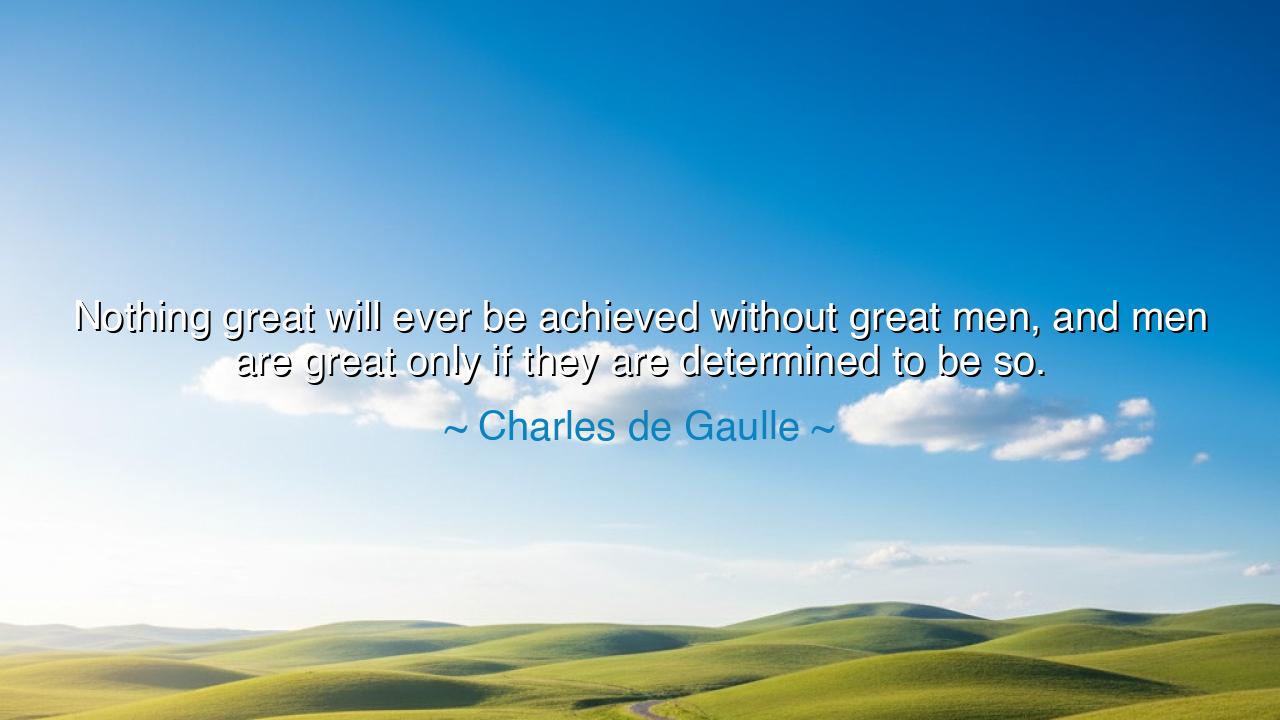
Nothing great will ever be achieved without great men, and men
Nothing great will ever be achieved without great men, and men are great only if they are determined to be so.






Hear, O sons and daughters of destiny, the words of Charles de Gaulle, the soldier, the statesman, the guardian of a nation’s soul: “Nothing great will ever be achieved without great men, and men are great only if they are determined to be so.” These words are a clarion call to courage, a reminder that greatness is neither given by fate nor born of privilege—it is forged through will. For de Gaulle, who carried France through its darkest night and lifted her again into the light, this truth was not philosophy—it was lived experience.
In this declaration, he unveils a principle that has guided all epochs: greatness is not accidental. The mountains of history were not raised by chance; they were carved by those who refused to bow before despair. A man becomes great not because destiny chose him, but because he chooses himself—chooses to endure, to strive, to rise when all others fall. De Gaulle spoke these words as one who had walked through ruin and yet refused to surrender to it. When France lay defeated in 1940, when her cities trembled and her leaders despaired, he stood alone in defiance, proclaiming from exile that the flame of France must not die. That was not circumstance—it was determination made flesh.
To understand this quote is to understand the mystery of willpower. Every great achievement—every victory, invention, or work of art—was first born in the invisible fortress of determination. Without such resolve, even genius becomes dust; with it, even the ordinary rise to glory. The great men of whom de Gaulle speaks are not gods—they are men and women of blood and doubt, who simply refuse to yield to weakness. They see beyond their limitations and, in doing so, transcend them. Greatness, therefore, is a decision renewed each day—to persist despite hardship, to create despite fear, to serve despite fatigue.
Consider the life of Abraham Lincoln, who rose from poverty and failure to save a fractured nation. His greatness was not inherited; it was earned through the crucible of perseverance. He suffered ridicule, defeat, and grief beyond measure, yet he clung to his purpose with unbreakable resolve. Like de Gaulle, he understood that determination transforms adversity into strength. The measure of a person’s greatness is not their triumphs, but the endurance that carries them through storms.
De Gaulle’s insight also speaks to the essence of leadership. Nations rise and fall not merely through laws or armies, but through the strength of those who lead them. Great men and women are those who embody conviction when others falter, who bear the burden of responsibility not for glory, but for principle. Such leaders see the horizon where others see only fog. In their hearts burns the belief that human will, united with moral purpose, can alter the course of history itself.
But let us not mistake greatness for arrogance or domination. True greatness, as de Gaulle knew, is born of service and sacrifice. It is the quiet determination to build rather than destroy, to lift rather than exploit. Greatness is not the possession of power—it is the power to possess oneself. Those who are determined to be great do not seek applause, but purpose; they do not bend others to their will, but dedicate their will to the good of others.
The lesson, O listener, is clear: determine yourself to be great. Do not wait for opportunity to anoint you—create it with your labor and courage. Cultivate within your heart the discipline of perseverance, the clarity of purpose, and the humility to serve. Greatness is not the privilege of the chosen few; it is the reward of those who choose steadfastness in the face of trial.
Thus, the teaching of Charles de Gaulle endures through the ages: no monument, no empire, no act of genius comes to life without the fire of human will. And that fire burns in all who dare to light it. For it is not destiny that makes men great—it is determination, that divine flame which turns the fragile into the formidable, and the mortal into the immortal.






AAdministratorAdministrator
Welcome, honored guests. Please leave a comment, we will respond soon